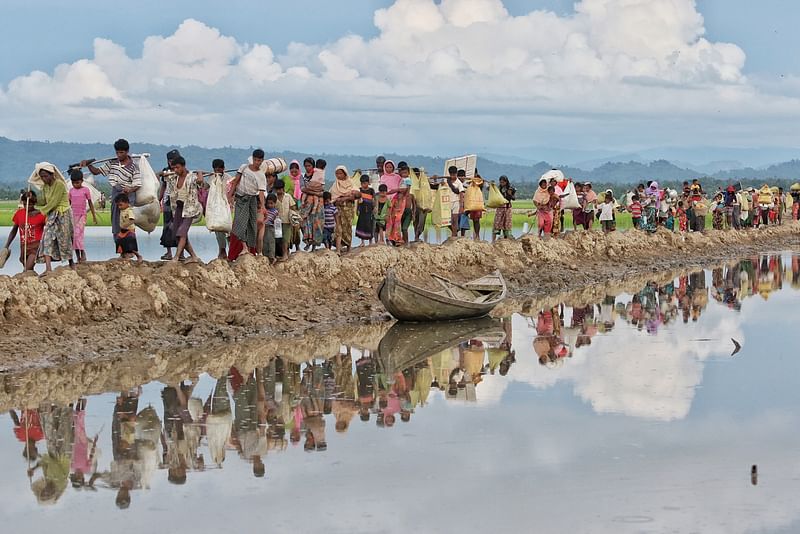Are Myanmar’s allegations part of its strategy?

It should not be dismissed that the latest situation emerging in Rakhine may be a part of Myanmar's strategic mission.
The present government of Bangladesh, since its assumption of power in 2009, has always responded to the Myanmar government's repeated calls to ensure border security. Several times Bangladesh has handed over members of extremist outfits to Myanmar. However, Myanmar has changed its tone. On Monday, the spokesperson of its president's office, Zaw Htay, told a press briefing, "The separatist Arakan Army and ARSA terrorist groups are operating from Bangladesh and have set up hide-outs there."
Security experts of Bangladesh smell a rat in their allegations and the foreign ministry has already denied the statement. Why is Myanmar raising such allegations all on a sudden?
The Arakan Army is a Buddhist one and ARSA (Arakan Rohingya Salvation Army) is a Rohingya-associated organisation. Myanmar has been accusing the Rohingyas of terrorism prior to this. Earlier, it had brutally attacked the Rohingyas following the so-called attacks on police posts. They also deployed large numbers of troops on the border. Myanmar is rife with communal conflict.
Two years have passed. Now just as the general elections of Bangladesh are over, fresh 'Buddhist terrorist attacks’ occurred at four police posts. Reports also came of the death of seven security men in the attacks. The reports of the Rakhine incidents are obviously Myanmar government's version as foreign journalists or organisations are restricted from entry.
The majority of Myanmar's population is Buddhist and the Magh people in the Rakhine province are also Buddhist. Clashes between the rulers, who are Bamar, and the Rakhine (Arakanese) Buddhists are not new. The Bamar never treated the Maghs fairly when to came to the question of Arakan’s autonomy. But, they managed to win the Maghs’ support by using religion.
Do they aim to increase the number of armies along the Bangladesh-Myanmar border and continue military presence? The international community must consider the severe impact of the Bamar-Magh clashes on the lives of the Rohingyas. Myanmar will not certainly push the Maghs into Bangladesh or other countries to handle the so-called 'Buddhist terrorists'. The distressed Rohingyas have been entrapped within the no-man’s land for those clashes. Unrest in Rakhine means legitimisation of increased military presence and added uncertainty over Rohingya repatriation. Bangladesh must be alert about Myanmar's strategy.
The report of two Arakan Army members being detained appeared in Bangladesh media just after the Myanmar allegations. How did the men, armed with modern weapons, remain in hiding for such a long time and how were they 'captured' or 'surrendered' just after the allegations were made? This, however, proves the Bangladesh government’s commitment against foreign extremists.
The international community must realise that if Myanmar does not solve the communal strife issues centrally, the Rakhine crisis will continue. The questions of Rohingya citizenship and their safe return will remain unresolved. This means further pressure on Bangladesh.